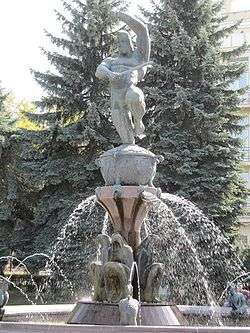Sosruko
Sosruko, Sosruquo, or Sosriqwa (Ossetian: Сослан, Soslan; Kabardian: Сосрыкъуэ, Sosryqwa; Karachay-Balkar: Сосурукъ/Сосуркъа, Sosuruq/Sosurqa) is a central character in many cycles of the Nart sagas of the Caucasus.

Sosruko is a powerful but devious man who is the smallest of the Narts; as a character, he is sometimes cast in the light of the trickster god, comparable to the Scandinavian Loki (who finds a closer parallel in the Nart Syrdon, however), Georgian Amirani, or the Ancient Greek Prometheus. It is possible that at least in the latter case, Sosruku served as a direct inspiration.
In Circassian mythology, it was the Nart Sosriqwe, minion of the gods and his doting mother, Lady Satanaya, who stole fire from the giant.
Etymology
The name etymologically came from Turkic languages: Nogai suslan- "to look menacing", suslä "menacing, gloomy" (hence Ossetian: Soslan). The variants Abkhazian: Sasərqwa, Adyghe: Саусырыкъо [saːwsərəqʷa], Kabardian: Сосрыкъуэ [sawsərəqʷa], Ubykh: [sawsərəqʷa], Digor Ossetian: Sosruqo, Sozyryqo, Sozuruqo. The name Sosruko [saːwsərəqʷa] is from Circassian sa "sword" + wa "hit" + sər "heat" + qʷa "son"; hence literally “The son of the fiery sword hit”.
References
External links
- Nart Tales of the Circassians - Reocities personal page
- The Circassian Nart Epos - International Centre for Circassian Studies